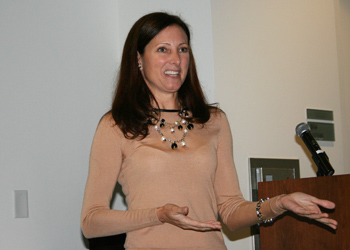
Female faculty, staff, students, alumni (and even a few men!) poured into Hannon Library on the evening of January 23 for the chance to hear Kelly Watson EMBA ’06 share her expert insights on the belief systems that continue to hold women back in their lives and careers. In her discussion, she addressed several age-old questions: Why do women find work-life balance so challenging? Why is “having it all” such an elusive quest? Why haven’t women yet reached equality in the leadership ranks?
Watson – along with co-authors Jodi Ecker Detjen and Michelle A. Waters – wrote “The Orange Line: A Woman’s Guide to Integrating Career, Family and Life.” Their book brings a unique perspective to the work-life debate, acknowledging that work-life solutions must balance the needs of the individual with the realities of organizational goals. In their research, they uncovered how women trap themselves with outdated but pervasive ideals and rigid behavioral rules that define the ideal woman.
They felt compelled to write this book for a number of reasons: there are still few women in power, men continue to out earn their female counterparts, women shoulder the majority of household and family duties, workplace barriers still exist, and policy doesn’t seem to be changing. Women, according to Watson, feel enormous pressure to do it all, look good and be nice. She shared advice on how women can recognize these behaviors, overcome these assumptions, and form new, healthier perspectives.
In “The Orange Line”, Watson and her co-authors help women be more conscious of the assumptions underlying their decision making so they can live an integrated life and pursue their career goals. From interviews with 118 college-educated women, they found women are blocked from manifesting their career and life goals because they buy into a system of adopted beliefs and cultural rules that distract or prevent them from these goals. By removing what they call the “Feminine Filter”, women can make more enlightened career and life choices based on their true purpose instead of blind and habitual acceptance.
So what exactly does “The Orange Line” mean? According to Watson, the orange line represents a career path characterized by both a full and enjoyable career as well as a robust, integrated life. Instead of a singular focus on work, orange line individuals learn to pace themselves early on, taking breaks and enhancing their life with activities and people outside of work. Alternatively, women who follow the green line are on an upward trajectory, get promoted often and are generally all about their career, while women who follow the red line tend to halt their careers around their mid-30s to raise a family and thus fall behind. The orange line career track combines both lines and keeps family and career in perspective. Women can still end up in positions of power, but they’ll have the added component of health, wellness and spirit.
Watson is applying key lessons from her book in her own day-to-day life. She admits it’s an ongoing effort because she still likes to do it all which sets her up for burnout. But she continues practicing the skills every day and knows for a fact that it works.
“We’re all a work in progress, that’s a big message in the book,” says Watson. “Nobody is living the orange line perfectly and that’s okay. This book teaches women how to lean into their lives, choose what they want to do, and how to overcome the pressure. If you can change individuals, you can change the system.”
“The Orange Line” is available for purchase on Amazon as well as Barnes & Noble.



